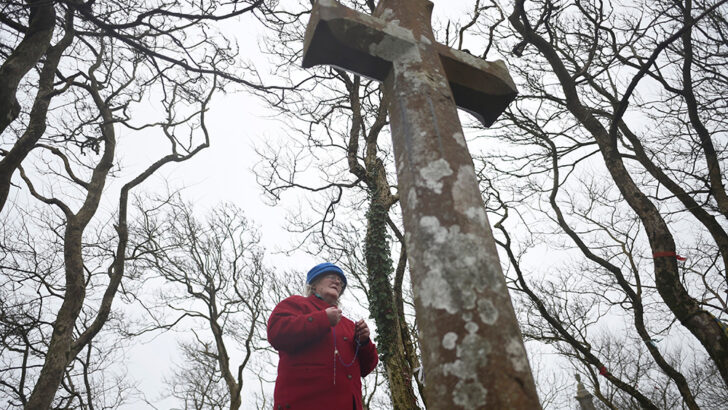Turning to the past with dread, I forced myself to watch Stolen, a new RTÉ documentary billed as the inside story of the Mother and Baby homes.
It was not only the wounded past I dreaded to look at, but a documentary which I (rightly) guessed would approach this tragic subject, with its own provocative perspective. This was no dispassionate examination of a shameful past. The personal interviews and facts were emotive enough without the embellishment of interspersed monologues and finger-pointing. The Catholic Church, no innocent in this, was cast as the main culprit.
I decided to watch Stolen after a politician lamented the darkness of the past. Dark and bitter it was too: full of pain, abandonment, forced adoptions, indifference, infant deaths from malnutrition, unmarked graves, even callousness, cruelty and bullying from priests and nuns.
And yet there was light too: the light of truth, the light of hope, the light of love which shone unexpectedly in bittersweet reunions and embraces, as one survivor put it, that seemed to last forever. There was a joy too in the surviving baby who went on to have her own daughter, a beautiful little girl.
Reflection
Stolen’s spotlight is a torch made with all the values, sensibilities and hindsight of 2024, long after the fledgling Irish state was an impoverished new-born. This first chapter told by RTÉ foreshadowed our own present drama. Chapter two is a tale of a wealthy Ireland where infants no longer die of starvation in over-crowded mother and baby homes, but with medical assistance, and “informed” motherly consent, all encouraged by a “pro-choice” media and state agenda.
Stolen made a single reference to abortion, implying it was a kind of liberation, mentioning it in the same breath as the state’s 1973 decision to grant single mothers child benefit.
This documentary rightly laments that 9,000 infants died in the Mother and Baby homes between 1922 and 1998, concluding that some of these deaths were from wilful neglect. But how is our era of abortion in any way superior?
We do indeed suffer from a dark past but the present is even darker: an estimated 40,000 unborn boys and girls have been deliberately killed”
The State and the Church can bear some blame for these past infant deaths but abortion? As the Church implacably opposes abortion, we can lay that evil at the feet of the state and the women and the men of Ireland who voted for it.
We do indeed suffer from a dark past but the present is even darker: an estimated 40,000 unborn boys and girls have been deliberately killed before they drew their first breath. A slim minority might have had disabilities (no excuse) but many others were simply an unwanted inconvenience.
It is just that we examine our past and right the wrongs but in this generation, there is an opportunity to do right. Where are the documentaries on the present injustice of abortion? Where are the politicians? Where are the fathers? Where are the mothers? Where is the media?
Clarity
In Stolen we see images of brown envelopes, files, death certificates, names and even unmarked graves. Aborted boys and girls are awarded no certificates, no names, no graves. In a world of mass media there are no scenes on television of this medical procedure. It’s all neatly hidden away.
Abortion kills not just the baby but the light, the hope of bittersweet reunions, embraces that last forever. For all its faults – and there are many – it is the Church which offers mercy and lifts up women, broken and traumatised by abortion.
Men voted overwhelmingly for abortion. No surprise there – as an early feminist once called abortion the ultimate exploitation of women and children.
Some people went and took their children and grandchildren away from these homes. Others found less than ideal ways to keep the children”
Let’s face it, abortion suits irresponsible men even more than the Mother and Baby homes. Though Stolen casts some men in a negative light, they got off lightly.
One interviewee said the men and women of Ireland “colluded” with an all-powerful church and state to deal with unwanted pregnancies through these institutions. But not everyone “colluded”. Some people went and took their children and grandchildren away from these homes. Others found less than ideal ways to keep the children (how many sisters were really mothers?) The Irish mother of the late musician, Phil Lynott, of Thin Lizzy fame, took temporary shelter in one of these Mother and Baby homes in Birmingham. It was not a happy experience but her child survived to share his talents. Phil Lynott lived to play and dance in the moonlight and share that joy with us.
Possibilities
My own grandmother did not collude with a bad system. Daisy came of age in the 1920s, a post-war world where many of the young men of her generation had perished in war. As a young unmarried woman she fell pregnant not once, but twice, in Protestant England, where Mother and Baby homes also existed.
Her plight was deemed shameful in her small village. But Daisy was a strong woman with a strong family. I never quite appreciated what she did in the years before she met my grandfather, married and gave birth to my dad. In her desperation, would she have “consented” to a “safe and legal” abortion if this was on offer? Quite possibly. Thank God for her strength and her love, that truly tough love. Because without it, cherished members of my family would have been stolen away.
It is so much easier to scorn the sins of the past than to right the wrongs of this era, to safeguard the lives and memories stolen today”
As for Stolen, former Taoiseach Enda Kenny, who U-turned on abortion, is featured condemning the injustice of the past century when we buried “our compassion, mercy and humanity”.
Frankly it is still buried, along with our heads, and will remain so until RTÉ or other media decide to shine a light on the darkness of this generation. In the meantime, it is so much easier to scorn the sins of the past than to right the wrongs of this era, to safeguard the lives and memories stolen today.


 Martina Purdy
Martina Purdy A woman prays with a rosary at a stone cross during a pilgrimage to the holy well of St Brigid in Liscannor, Ireland. Photo: OSV News/Clodagh Kilcoyne, Reuters
A woman prays with a rosary at a stone cross during a pilgrimage to the holy well of St Brigid in Liscannor, Ireland. Photo: OSV News/Clodagh Kilcoyne, Reuters 